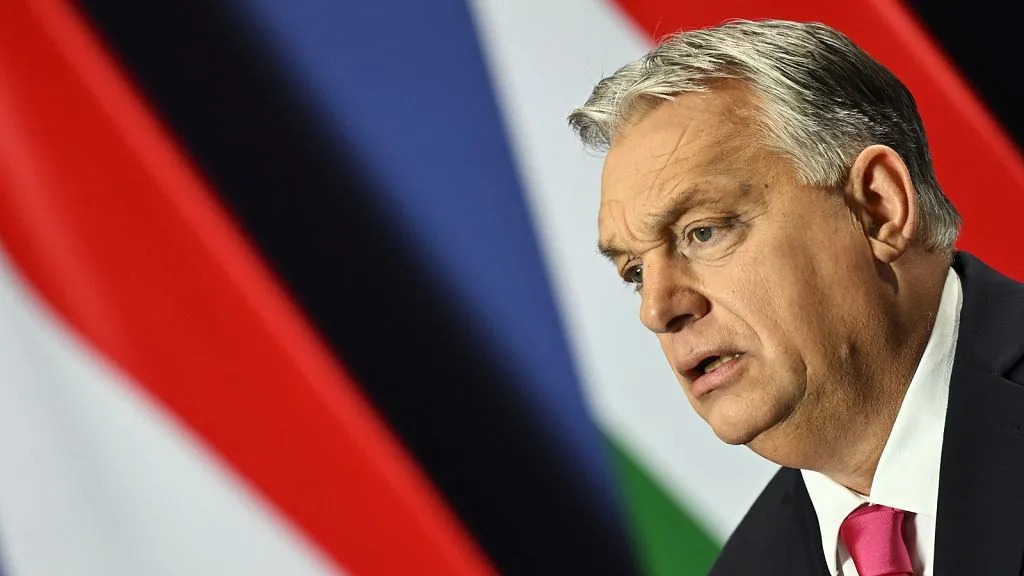U.S. national security adviser Jake Sullivan said that he and his NATO counterparts cautioned Hungary on Wednesday against further delaying Sweden’s membership in the military alliance, and he warned that patience in Washington has its limits.
Lawmakers from the party of Hungarian Prime Minister Viktor Orbán boycotted an emergency session of parliament on Monday where a vote was scheduled to place Sweden’s bid to join NATO on the legislative agenda, adding to 18 months of delays that have angered Hungary’s allies.
The governing Fidesz party, which holds an absolute majority in Hungary's parliament, has stalled Sweden’s bid since July 2022, alleging that Swedish politicians have told “blatant lies” about the state of Hungarian democracy. The party insists that Sweden’s prime minister must come to Hungary first.
“We heard security adviser after security adviser say that it’s past time for Sweden to get in, and to directly address the representative from Hungary,” Sullivan told reporters after a meeting of the organization’s top security officials at NATO headquarters in Brussels.
Sullivan said that he and his colleagues had impressed upon Hungary that “it’s a matter of credibility and obligation that they take the necessary steps” to complete the parliamentary procedures to ratify Sweden’s accession.
Sweden, along with neighboring Finland, set aside decades of military nonalignment to seek protection under NATO’s collective security umbrella after Russia launched a full-scale invasion of Ukraine on Feb. 24, 2022.
Finland has since joined the trans-Atlantic alliance. The country, along with the other 30 allies, must all agree that Sweden should stand among NATO’s ranks. Hungary is the only member standing in its way.
Sullivan said that he wouldn't “stand here today and make particular threats, or speculation about steps that we would take down the road, but of course our patience on this can’t be unlimited either.”
He said the U.S. will “continue to watch it carefully, but hope that there is a constructive resolution to this issue in the very near term.”
Orbán, who has broken ranks with NATO allies by adopting a Kremlin-friendly stance toward Russia’s war in Ukraine, has said that he invited Swedish Prime Minister Ulf Kristersson to Budapest to discuss “future cooperation in the field of security and defense as allies and partners.”
Unless another emergency session of Hungary's parliament is called to debate Sweden’s bid, the assembly is due to sit for its regular session on Feb. 26.
Brussels launches legal action against Hungary's controversial 'sovereignty law'
The legislation, spearheaded by Viktor Orbán's ruling party and approved by the parliament in mid-December, empowers the state to investigate people and organisations suspected of undermining the country's sovereignty, with potential convictions of up to three years in prison.
Orbán, who frequently lambastes his critics as agents paid for by Western entities, says the law is necessary to protect Hungary from undue political interference.
The bill's implementation rests on the newly established "Office for the Defence of Sovereignty," which can collect information on individuals or groups that receive foreign funding and are perceived to influence the country's political debate and electoral processes. Hungary's secret services are compelled to assist the authority.
The provisions of the law, particularly its broad-yet-vague mandate and lack of judicial oversight, have raised serious concerns from civil society and independent journalists, who fear they will be unfairly targeted for refusing to follow Orbán's political dogma and be powerless to contest the decisions taken by the "sovereignty office."
The European Commission echoed these considerations and said on Wednesday that the law violates a wide range of fundamental values and legal guarantees, such as the principle of democracy, the right to private life, the protection of personal data, freedom of expression, information and association, and the right to a fair trial, among others.
The United States had previously criticised the law, decrying its "draconian tools that can be used to intimidate and punish those with views not shared by the ruling party."
Hungary has two months to reply to the Commission's objections. The letter of formal notice is the first step under the infringement procedure, which can lead to a lawsuit and daily fines before the European Court of Justice.
Zoltan Kovacs, a spokesperson of Orbán's government, reacted furiously to the news and said the legal action had been launched to protect George Soros, the Hungarian-born billionaire and founder of the Open Society Foundations.
The new clash between Brussels and Budapest comes mere days after a high-stakes summit that saw Orbán lift his veto on a €50-billion special fund for Ukraine, following a pressure campaign from his fellow leaders and the European Parliament.
As part of the negotiations that preceded the summit, Orbán had demanded the immediate release of the roughly €21 billion in recovery and cohesion funds that the European Commission has withheld over persistent rule-of-law deficiencies inside Hungary. The executive, however, insists that no cash will be unlocked until the country fulfils a series of "milestones" and conditions to address the situation.
Norway must brace for conflict with Russia amid Sweden and Finland’s Nato bids, warns defence minister
Norway’s defence minister urged his country to be ready for a possible conflict with Russia even after the end of Moscow’s invasion of Ukraine.
He said Russia might retaliate in response to Finland and Sweden‘s new Nato membership. Other Nato nations have also explicitly warned of Russia’s aggression and plans to disrupt peace in the region in the past few months.
“We must be ready that Russia may review its plans and where it deploys its forces in response to Finland and Sweden’s Nato membership," Bjørn Arild Gram said on Monday during a lecture at the Oslo Military Society Assembly.
The top official was referring to the ongoing negotiations to bring Sweden into the Nato fold as its application has been held up by Turkey and Hungary. Finland became the 31st member to join the North Atlantic bloc in April last year, triggering Russia which sees the alliance’s combined military strength as a threat.
Mr Gram said Norway’s armed forces must be prepared for conflict to break out. “We must be able to respond in a timely manner and together with allies,” he said.
Norway needs to increase its investment in national defence, he said.
He said any emerging signs of democracy have been quashed in Russia, and added that “there is no indication Russia will become like us”.
"The few Russians who are trying to protest are being thrown behind bars or sent to the war. There they are being used as cannon fodder,” he said. There is no opposition in Russia and no freedom of media or presence of civil society, which can “somehow counter the increasingly authoritarian regime”, he added.
This new Russia “will stay with us for a long time”, even after its war against Ukraine ends, Mr Gram said in his lecture.
Last month, German defence minister Boris Pistorious warned that Russia is likely to attack a Nato nation in five to eight years.
"We hear threats from the Kremlin almost every day ... so we have to take into account that Vladimir Putin might even attack a Nato country one day," he told the German outlet Der Tagesspiegel.
“Our experts expect a period of five to eight years in which this could be possible,” the German minister said.
In December, the head of Poland’s national security agency Jacek Siewiera estimated that Russia could attack Nato countries within three years in an interview with Nasz Dziennik.
An attack could come from Nato’s eastern flank which includes countries such as Poland, Estonia, Romania and Lithuania, he said, estimating they had three years to prepare for a confrontation.
All Swedish citizens must be ready for war, Micael Bydén, commander-in-chief of the armed forces of Sweden and Swedish minister of civil defence Carl-Oskar Bohlin warned.




